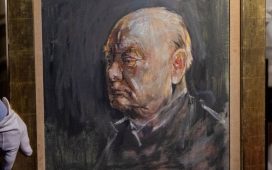A limited edition single volume of the long-running manga One Piece is being billed as the longest book in existence.
At 21,450 pages, it is physically impossible to read, making it less of a book and more of a sculpture.
Priced at €1,900 (£1,640), the book isn’t credited to Eiichiro Oda, the writer and artist behind One Piece, which has been serialised in Japanese magazine Shōnen Jump every week since 1997. It is being sold instead as the work of Ilan Manouach, the multidisciplinary artist who has designed the limited edition volume, which is titled ONEPIECE.
Manouach printed out the Japanese digital edition of One Piece and bound it together, treating the comic not as a book but as “sculptural material”, according to the book/ artwork’s French publisher JBE.
A spokesperson for JBE told the Guardian that ONEPIECE is an “unreadable sculpture that takes the shape of a book – the largest one to date in page numbers and spine width – that materialises the ecosystem of online dissemination of comics.” Whatever it is classed as, there certainly seems to be a market for ONEPIECE – the limited edition run of 50 copies sold out within days of its release on 7 September.
Manouach’s piece came about because of the “profusion of available online content and the rampant digitisation of the comics industry” which “challenges the state-of-the-art of comics craftsmanship”, according to his publisher. “Ilan Manouach’s ONEPIECE proposes to shift the understanding of digital comics from a qualitative examination of the formal possibilities of digital comics to a quantitative reappraisal of ‘comics as Big Data’.”

JBE also described comics as “dual objects”, having a “use value” for readers and an “exchange value” for collectors. In creating a book you cannot read, Manouach apparently wanted to highlight the way comics exist as both commodity and literature. It’s a theory that the comics industry itself has already embraced — one company, CGC, offers a service where it grades customers’ comics and encases them in protective plastic.
When asked if Eiichiro Oda had been involved or consulted about the creation of ONEPIECE, and if there were any copyright considerations, JBE’s spokesperson said: “This piece is about Manouach’s work around ecosystems of comics, here as a sculptor who uses online dissemination as source material, not reading copyrighted content.” There could be no infringement of copyright, the publisher believes, because it is physically impossible to read the book.
Keita Murano, a member of the international rights staff at Shueisha, the Japanese publisher of Oda’s manga, confirmed that his company had not been consulted about the JBE book. He said: “The product you mentioned is not official. We don’t give permission to them. Our licensee in France which publishes One Piece is the publisher Glénat.”
Eiichiro Oda may not be getting any royalties from the publication of ONEPIECE, but his comic series have already made him the richest manga creator of all time, with an estimated net worth of around $200m. His original One Piece manga is listed by the Guinness Book of Records as having the most copies published for the same comic book series by a single author, with more than 416m copies printed to date.
The sale of the ONEPIECE sculpture isn’t the first time that the art world has made lots of money from the comics world – pop artist Roy Lichtenstein built a career on it, with his monumental canvases copied directly from existing comics: Whaam! (1963), lifted from a panel in DC’s All-American Men of War from the previous year, while Sleeping Girl – which last sold for $44.8m 10 years ago – was based on an illustration from another DC comic, in issue 105 of Girls’ Romances.








